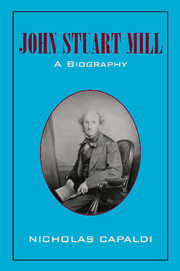Book contents
- Frontmatter
- Contents
- Preface
- Acknowledgments
- 1 Childhood and Early Education: The Great Experiment (1806–1820)
- 2 Company Man and Youthful Propagandist (1821–1826)
- 3 Crisis (1826–1830)
- 4 The Discovery of Romance and Romanticism (1830–1840)
- 5 The Transitional Essays
- 6 Intellectual Success (1840–1845)
- 7 Worldly Success (1846–1850)
- 8 Private Years (1850–1859)
- 9 The Memorial Essays
- 10 Public Intellectual (1859–1869)
- 11 Last Years (1869–1873)
- Notes
- Bibliography
- Index
Preface
Published online by Cambridge University Press: 17 July 2009
- Frontmatter
- Contents
- Preface
- Acknowledgments
- 1 Childhood and Early Education: The Great Experiment (1806–1820)
- 2 Company Man and Youthful Propagandist (1821–1826)
- 3 Crisis (1826–1830)
- 4 The Discovery of Romance and Romanticism (1830–1840)
- 5 The Transitional Essays
- 6 Intellectual Success (1840–1845)
- 7 Worldly Success (1846–1850)
- 8 Private Years (1850–1859)
- 9 The Memorial Essays
- 10 Public Intellectual (1859–1869)
- 11 Last Years (1869–1873)
- Notes
- Bibliography
- Index
Summary
John Stuart Mill (1806–1873) was the most influential British philosopher of the nineteenth century, making significant contributions to all of the major areas of philosophy, including metaphysics, epistemology, ethics, social and political philosophy, the philosophy of religion, and the philosophy of education. The System of Logic (1843) achieved the status of a canonical textbook. In addition, Mill achieved fame as an economist in 1848 with the publication of the Principles of Political Economy, a work that went through seven editions in his own lifetime. Difficulties aside, Mill was the last major British philosopher to present an integrated view of the whole of philosophy and to relate the theoretical and normative dimensions of his thought in a direct fashion.
More than just a writer, Mill was a public figure. His technical work in philosophy and economics was always in the service of the discussion of controversial issues of public policy. In many ways, he was the quintessential Victorian intellectual, bringing his critical faculties to bear on all of the major issues of the day in a manner that was accessible to the average intelligent layperson. Early in his life, Mill conceived the role of being the conscience of his society as a function of journalism, but toward the end of his life he increasingly associated that function with the university. In the twentieth century, only Bertrand Russell has come close to achieving the kind of general public recognition accorded to Mill in the nineteenth.
Information
- Type
- Chapter
- Information
- John Stuart MillA Biography, pp. ix - xviiiPublisher: Cambridge University PressPrint publication year: 2004
